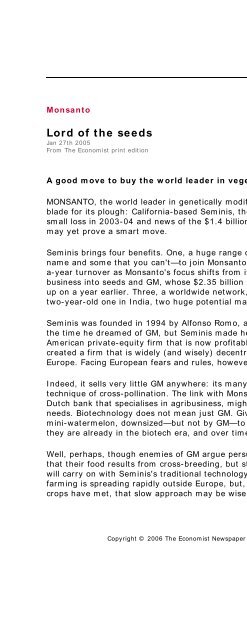The Economist - January 29th, 2005
The Economist - January 29th, 2005
The Economist - January 29th, 2005
Create successful ePaper yourself
Turn your PDF publications into a flip-book with our unique Google optimized e-Paper software.
Monsanto<br />
Lord of the seeds<br />
Jan 27th <strong>2005</strong><br />
From <strong>The</strong> <strong>Economist</strong> print edition<br />
A good move to buy the world leader in vegetable seeds<br />
MONSANTO, the world leader in genetically modified (GM) grains and oilseeds, is buying a second<br />
blade for its plough: California-based Seminis, the leader in vegetable seeds. Seminis made a<br />
small loss in 2003-04 and news of the $1.4 billion buy cut Monsanto's share price by 6%. But it<br />
may yet prove a smart move.<br />
Seminis brings four benefits. One, a huge range of new crops—almost any vegetable you can<br />
name and some that you can't—to join Monsanto's maize, soya and others. Two, an extra $550ma-year<br />
turnover as Monsanto's focus shifts from its $3.2 billion (but slow-growing) herbicide<br />
business into seeds and GM, whose $2.35 billion sales in its latest reported 12 months were 24%<br />
up on a year earlier. Three, a worldwide network, including a new operations centre in China and a<br />
two-year-old one in India, two huge potential markets. Four, a non-GM image.<br />
Seminis was founded in 1994 by Alfonso Romo, a Mexican tycoon, as part of his Savia group. At<br />
the time he dreamed of GM, but Seminis made heavy losses, and in 2003 he sold to Fox Paine, an<br />
American private-equity firm that is now profitably selling out. Mr Romo's string of acquisitions<br />
created a firm that is widely (and wisely) decentralised. Much of its research and sales lies in<br />
Europe. Facing European fears and rules, however, Seminis has not tried to push GM there.<br />
Indeed, it sells very little GM anywhere: its many new varieties arise from advanced use of the old<br />
technique of cross-pollination. <strong>The</strong> link with Monsanto, suggests Gillian Turco of Rabobank, a<br />
Dutch bank that specialises in agribusiness, might, paradoxically, be exactly what the GM cause<br />
needs. Biotechnology does not mean just GM. Give consumers something as unusual as Seminis's<br />
mini-watermelon, downsized—but not by GM—to suit one person, not eight, and they may realise<br />
they are already in the biotech era, and over time lose their fear of GM.<br />
Well, perhaps, though enemies of GM argue persuasively that Europeans already know very well<br />
that their food results from cross-breeding, but still think GM a step too far. Monsanto itself says it<br />
will carry on with Seminis's traditional technology, though it might use GM in the longer term. GM<br />
farming is spreading rapidly outside Europe, but, given the hassle that Monsanto's present GM<br />
crops have met, that slow approach may be wise.<br />
Copyright © 2006 <strong>The</strong> <strong>Economist</strong> Newspaper and <strong>The</strong> <strong>Economist</strong> Group. All rights reserved.



